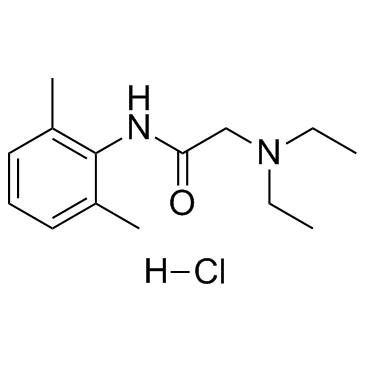Lidocaine hydrochloride (Lignocaine hydrochloride) |
| Catalog No.GC33831 |
El clorhidrato de lidocaÍna (clorhidrato de lidocaÍna) (clorhidrato de lidocaÍna) inhibe los canales de sodio que involucran voltaje complejo y dependencia del uso.
Products are for research use only. Not for human use. We do not sell to patients.

Cas No.: 73-78-9
Sample solution is provided at 25 µL, 10mM.
Lidocaine Hcl salt, an amide local anesthetic, has anti-inflammatory properties in vitro and in vivo, possibly due to an attenuation of pro-inflammatory cytokines, intracellular adhesion molecule-1 (ICAM-1), and reduction of neutrophils influx.Target: Lidocaine is a common local anesthetic and antiarrhythmic drug. Lidocaine is used topically to relieve itching, burning and pain from skin inflammations, injected as a dental anesthetic or as a local anesthetic for minor surgery. Lidocaine, the first amino amide-type local anesthetic, was first synthesized under the name xylocaine by Swedish chemist Nils Lofgren in 1943. His colleague Bengt Lundqvist performed the first injection anesthesia experiments on himself.Lidocaine is approximately 95% metabolized (dealkylated) in the liver by CYP3A4 to the pharmacologically-active metabolites monoethylglycinexylidide (MEGX) and then subsequently to the inactive glycine xylidide. MEGX has a longer half life than lidocaine but also is a less potent sodium channel blocker. The elimination half-life of lidocaine is approximately 90-120 minutes in most patients. This may be prolonged in patients with hepatic impairment (average 343 minutes) or congestive heart failure (average 136 minutes).
[1]. VAN DER Wal S, et al. Lidocaine increases the anti-inflammatory cytokine IL-10 following mechanical ventilation in healthy mice. Acta Anaesthesiol Scand. 2014 Oct 14. [2]. Acevedo-Arcique CM, et al. Lidocaine, dexmedetomidine and their combination reduce isoflurane minimum alveolar concentration in dogs. PLoS One. 2014 Sep 18;9(9):e106620.
Average Rating: 5 (Based on Reviews and 37 reference(s) in Google Scholar.)
GLPBIO products are for RESEARCH USE ONLY. Please make sure your review or question is research based.
Required fields are marked with *




















